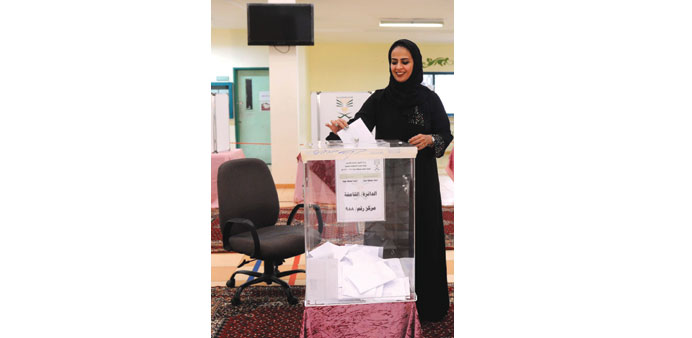Saudi women cast their ballots in the kingdom’s first elections in which women are allowed to vote and stand as candidates
Agencies
Riyadh
Saudi Arabian women voted for the first time yesterday in local council elections and also stood as candidates, a step hailed by some activists as a historic change.
“As a first step it is a great achievement. Now we feel we are part of society, that we contribute,” said Sara Ahmed, 30, a physiotherapist entering a polling station in north Riyadh. “We talk a lot about it, it’s a historic day for us.”
“Now women have a voice,” Awatef Marzooq said after casting her ballot at a school in the capital.
“I cried. This is something that we only used to see on television taking place in other countries.”
Despite the novel presence of female contenders, Marzooq said she picked a male candidate because of his ideas including more nurseries.
“I voted for a man, but I hope a woman will win,” she said.
Mohamed al-Shammari, who had just dropped off his daughter, a teacher, said he had encouraged her to vote.
“We want to break this barrier,” he said.
“As long as she has her own place and there is no mixing with men, what prevents her from voting? We support anything that does not violate Shariah,” he said.
Among the 6,440 candidates are more than 900 women, who overcame a number of obstacles to participate in the landmark poll.
The election, which follows men-only polls in 2005 and 2011, is for two thirds of seats on councils that previously had only advisory powers, but will now have a limited decision making role in local government.
Under King Abdullah, who died in January and who announced in 2011 that women would be able to vote in this election, steps were taken for women to have a bigger public role, sending more of them to university and encouraging female employment.
Female voters said registration was hindered by factors including bureaucratic obstacles and a lack of transport.
As a result, women account for less than 10% percent of registered voters and few, if any, female candidates are expected to be elected when results are announced today.
“Even if men take all the seats, I feel we still won,” said Munifa, a nurse who lives outside Hafr al-Batin city in the kingdom’s northeast, where camels and sheep awaited slaughter at a celebration to follow declaration of the winners.
“I have a voice and it matters. It doesn’t matter if I vote for a man or a woman,” said another northeastern resident, who gave her name only as Noura, 24.
One-third of seats on Saudi Arabia’s 284 councils are appointed by the municipal affairs ministry, leaving women optimistic that they will at least be assigned some of them.
Some male voters said they lacked information about the female candidates.
“I didn’t see any woman’s campaign so I won’t be voting for a woman,” said Mohamed al-Ghamdi, 49, in Jeddah.
Ghamdi said he cast his ballot “to help establish a voting culture”.
According to election commission data, nearly 1.5mn people aged 18 and over were registered to vote.
This includes about 119,000 women, out of a total native Saudi population of almost 21mn.
“I think social media helped promote the elections,” said Mohamed Abdullah al-Kharji, deputy head of the electoral committee at King Salman Social Centre polling station in Riyadh.
Some voters hope that the elections will eventually be held for the advisory parliament, the Shura Council.
“There is no reason, if this is applied to municipal councils, that they would not apply it to the Shura,” said Riyadh Najm, a retired government official.
At the King Salman Social Centre in north Riyadh, where men and women went into different parts of the building to cast their ballots, voters of both sexes were greatly outnumbered by both election officials and journalists.
Iman al-Mashrawi, a paediatric surgeon in Riyadh, said she had been persuaded to vote by a friend who was running for office. “We are mothers, teachers, doctors. We are everywhere in our country the same as any man,” she said.
For now, according to some of the women voting yesterday, apart from the symbolic nature of casting a ballot, their hopes for change resulting from their votes are limited to purely local issues.
“I believe women want more parks, libraries for their children, health and fitness facilities for women. And just to be part of the decision,” said Ahmed, the physiotherapist.

A woman casts her ballot at a polling station in Jeddah yesterday.
